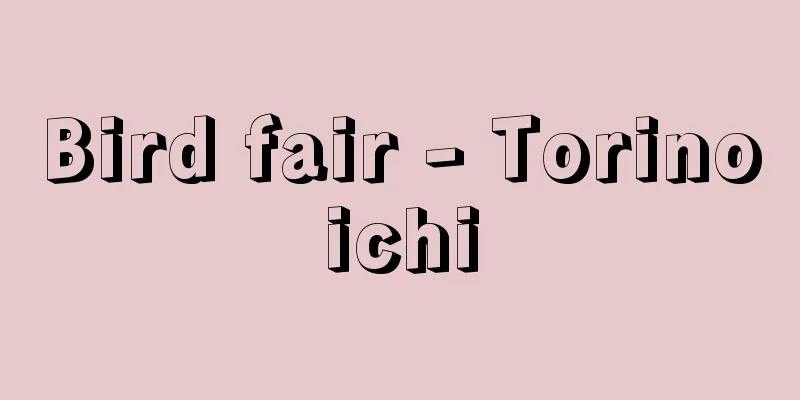Bird fair - Torinoichi

|
The festival of Otori Shrine is held on the day of the rooster in November. It was formerly called "Tori no Machi" (town of the rooster) and is familiarly referred to as "Otori-sama." "Machi" means festival. Otori Shrine enshrines Yamato Takeru no Mikoto and is worshipped as the god of good fortune and prosperity in business. Its main shrine is Otori Shrine in Sakai City, Osaka Prefecture, but its relationship with the Kanto Washi Shrine is unclear. In the Kanto region, the main shrine is Washinomiya Shrine in Kuki City, Saitama Prefecture, and since ancient times, this shrine has been the center of the belief in the practice of ascetic practices on the day of the rooster, and it seems to be the origin of Tori no Ichi. During the Edo period, Washi Shrine in Hanabatake-cho, Adachi Ward, Tokyo, once flourished and was called Hontori, where worshippers would offer chickens and pray for good fortune, then release them into the Asakusa Kannon Hall when the festival was over. Currently, many shrines and temples hold Tori no Ichi festivals that enshrine Otori Shrines, but the most famous festival from the late Edo period is that of Washi Shrine in Asakusa (Sensoku 3-chome, Taito Ward, Tokyo). The first Tori is called Ichi no Tori, the second Ni no Tori, and the year with the third Tori is called San no Tori. It is said that in a year with San no Tori, you should be careful of fires. On the day, stalls selling good luck charms are lined up for several hundred meters from the shrine, selling souvenirs such as Okame masks, rakes of various sizes decorated with oval coins, sweet potato heads (eight heads, etc.), and golden rice cakes, all with lively sales pitches. Items that cost 1,000 yen are said to go for as much as 10,000 ryo, and it is said that buyers should bargain to get the best deal. [Shoji Inoguchi] Source: Shogakukan Encyclopedia Nipponica About Encyclopedia Nipponica Information | Legend |
|
11月の酉の日に行われる鷲(おおとり)神社の祭礼。古くは「酉のまち」といい、「お酉様」と称して親しまれている。「まち」は祭りの意。鷲神社は日本武尊(やまとたけるのみこと)を祀(まつ)り、開運、商売繁盛の神として信仰され、本社は大阪府堺(さかい)市の大鳥神社とされているが、関東の鷲神社との関係は明らかでない。関東では埼玉県久喜(くき)市の鷲宮(わしのみや)神社が本社で、古くからこの社(やしろ)を中心に酉の日精進(しょうじん)の信仰があり、酉の市の始まりのようである。江戸時代には一時、現在の東京都足立(あだち)区花畑町の鷲神社が栄えて本酉(ほんとり)といわれ、参詣(さんけい)人がニワトリを献じて開運を祈り、終わると浅草観音(かんのん)堂に放ったという。現在はいくつもの社寺で大鳥神社を勧請(かんじょう)し酉の市の祭りをしているが、江戸時代後期からもっとも著名なのは浅草(東京都台東(たいとう)区千束三丁目)の鷲神社の酉の市である。初酉を一の酉、次を二の酉、三番目の酉のある年は三の酉という。三の酉のある年は火事に気をつけろという。当日は社から数百メートルの間、縁起物を売る露店が立ち並び、おかめの面や小判などをつけた大小さまざまの熊手(くまで)や、頭(かしら)の芋(いも)(八つ頭など)や黄金餅(こがねもち)などの土産(みやげ)物を、景気のよい売り声で売る。1000円のものなら1万両などといい、買い手は値切って買うものだともいう。 [井之口章次] 出典 小学館 日本大百科全書(ニッポニカ)日本大百科全書(ニッポニカ)について 情報 | 凡例 |
<<: Torinoko paper - Torinoko paper
Recommend
Sennosuke Yokota
Year of death: February 5, 1925 Year of birth: 8/2...
Two-coloured caladium
...It has many shield-shaped leaves that resemble...
Arrah
Ara. A town in the western part of Bihar, northeas...
Uwa Nishi Shrine - Uwase Shrine
…In September 1065 (Jiriyaku 1), a copy of a Dajo...
Ashitaba
Nutrition and Function Angelica tree is a perenni...
Attack aircraft - Carrier-borne aircraft
An aircraft to be deployed on an aircraft carrier...
Mountain Skipper - Miyamaseseri
A butterfly belonging to the order Lepidoptera, f...
Marlin drift net - Marlin drift net
...There are various drift net fisheries for flyi...
Dong Dau (English spelling)
…However, this cultural name, which encompasses a...
Kulp'ori ruins - Kuppori ruins (English spelling)
Located in Seopohang-dong, Golpo-ri, Yungi-gun, No...
Wise
〘Noun〙 Old name for the plant "gaimo (rush)&q...
Tarsier (spectacled monkey) - Tarsier (English spelling)
A general term for the prosimians of the Tarsiidae...
sep noi (English spelling) sepnoi
... Music is often associated with performing art...
Svea
…Population: 183,000 (1996). Cultural, religious ...
Sur la pointe (English spelling) sur la pointe
…The first male dancer is the Premier Dansour. Po...









